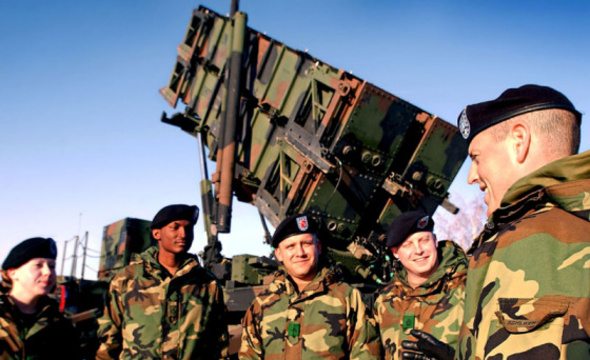How the Patriot deployment to Turkey will work
By Barbara Starr

U.S. troops will be in direct position for the first time to take action against the government of Syrian President Bashr al-Assad with the deployment of 400 American forces and two Patriot missile batteries in Turkey, possibly as soon as mid-January.
The missiles and troops will be under the overall control of NATO. But the missiles will be operated by U.S. forces with the ability to choose whether to override computer systems that automatically order firing against any incoming Scud missiles, according to U.S. military officials.
Defense Secretary Leon Panetta announced that he had signed orders for the Patriot missiles, emphasizing that he was sending a clear message to Syria that NATO will defend Turkey.
Syrian rocket and artillery fire have landed in Turkey and Syria has launched short range Scuds close to the Turkish border.
“We’ve made very clear to them that were going to protect countries in this region,” Panetta said. “We have to act to do what we have to do to make sure that we defend ourselves and make sure that Turkey can defend itself.”
Turkey asked for Patriot missiles as a defensive measure after several Turkish civilians were killed in cross border incidents.
But the recent Scud firings also clearly changed the alliance’s view of the risks on the expanding battlefield.
“Scuds, which are medium surface-to-surface missiles, are particularly worrisome because they can carry chemical payloads,” said Adm. James Stavridis, NATO’s Supreme Allied Commander, Europe, in a posting on his blog.
Stavridis said the missiles will “protect major population centers in Turkey from any possible incursions into NATO airspace.”
The 400 U.S. troops will comprise all support elements, including communications, intelligence and basic supply and transportation forces.
It was not clear yet which Patriot units would be sent, but U.S. military officials said it would likely be the most advanced version specifically designed to fire and hit incoming Scuds very quickly.
U.S. officers in charge of the actual fire control element of the system would be able to override the automatic firing mode. But the entire sequence of decisions happens within a few minutes of a Scud launch. So the reality is that troops in the field, rather than senior commanders at NATO headquarters in Brussels or in Washington, will be making those key decisions, according to those US military officials.
With the addition of Patriot batteries from Germany and the Netherlands, it is expected that a total of six Patriot systems will be deployed just a few miles from the Syrian border inside Turkey.
A U.S. military advance team is expected in Turkey within days for a final site survey.
A key issue officials said would be how to precisely place the Patriot missile radar elements to get maximum warning of a launch from inside Syria since it may not be certain where those launch points are located.
Not only would the Patriots pick up early warning of a launch, but so would overhead U.S. military satellites that are able to detect the initial infrared signature of a missile launch and then warn the Patriot units on the ground.
Stavridis confirmed that the U.S. units, along with the other Patriot batteries, will be directly tied into NATO’s extensive air defense system in southern Europe.
“I will retain operational command responsibility for the deployment of the six Patriot batteries. Over the coming days and weeks, we will train and exercise the layers of command down to the actual Patriot battery to make sure we are ready to expeditiously engage any potential incoming missiles,” Stavridis said.
via How the Patriot deployment to Turkey will work – CNN Security Clearance – CNN.com Blogs.



